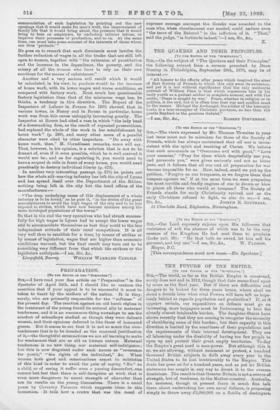PREPARATION.
[To Tits EDITOR OF THR "SPECTATOR.") Sru,—I have read your fine article on " Preparation " in the Spectator of April 24th, and I should like to venture the assertion that if your appeal is to be successful it must be taken to heart by the mothers of the nation. It is they, surely, who are primarily responsible for the " softness " of the present day. The reaction against an old harsh regime in the treatment of the young found its natural ally in maternal tenderness, and it is no uncommon thing nowadays to see the comfort of schoolboys studied as though they were delicate women, and their opinions deferred to like those of honoured guests. But it seems to me that it is not so much the over- tenderness that is to be dreaded as the reasoned justification of it,—the thoughtful extenuations we are all learning to make for weaknesses that are as old as human nature. Maternal tenderness is no now thing, nor maternal self-indulgence ; but this is now disguised under such names as "reverence for youth," "the rights of the individual," Sto. When women both good and conscientious resort to subtleties of this kind in order to avoid the pain of saying " No " to a child, or of seeing it suffer even a passing discomfort, one °mina bat feel that there is self-deception at work that is even more dangerous to morel strength of character than are its results on the young themselves. There is it small poem by Coventry Patmore which suggests ideas in this 'uonnexion. It tells how a crown that was the meed of supreme courage amongst the Greekb was awarded to the man who, when chastisement was needed, could endure even "the tears of the Beloved" in the infliction of it. "That," said the judge, "is fortitude indeed."—I am, Sir, &c., x.










































 Previous page
Previous page